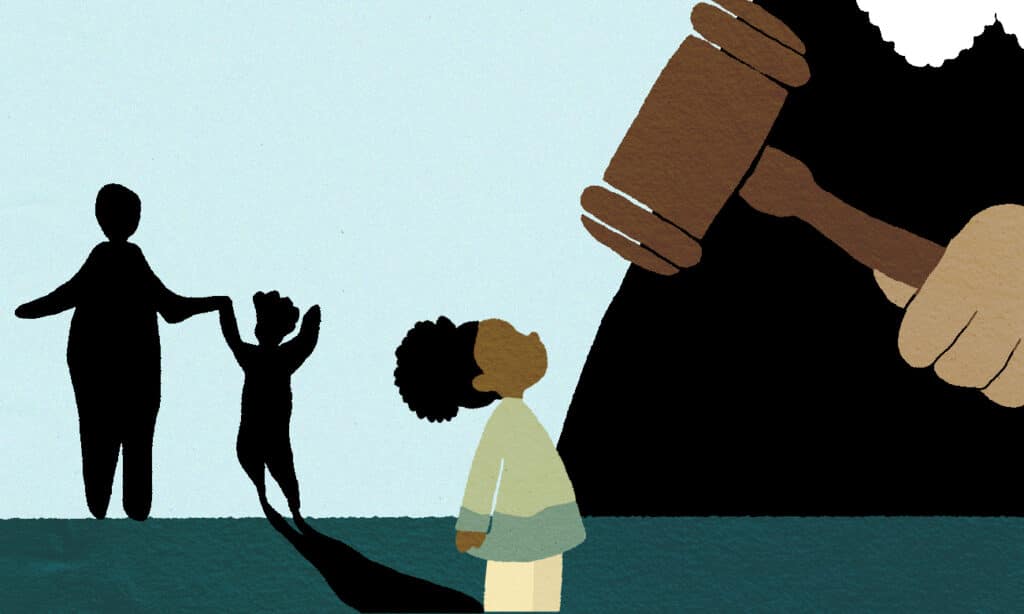
Two prominent civil rights groups are calling on the federal government to investigate Minnesota’s child welfare system, describing its discrimination against Black children and families as “egregious and shocking.”
The complaint submitted today by the National Association for the Advancement of Colored People and the New York-based advocacy group Children’s Rights seeks recourse through the Office of Civil Rights within the U.S. Department of Health and Human Services.
The activists highlight the number of children removed from their parents following investigations into abuse and neglect allegations, and point to particularly deep disparities in the Minneapolis and St. Paul regions. State and local officials are accused of “knowing, ongoing failure” to address these issues.
“The discriminatory and disproportionate removal of Black children from their families comes at a heavy cost to both children and parents,” the 30-page complaint states. “The State has failed to remedy the historic and ongoing harms caused by its child welfare system, and the discrimination against and disparate impacts upon Minnesota’s Black families have been egregious and shocking.”

The national groups are representing the Minneapolis NAACP, which has been outspoken on one recent child welfare case involving a Black family, detailed in The Imprint’s 2023 “Fighting for Kin” series.
“Black children and families have long endured suffering at the hands of Minnesota’s child welfare system,” Cynthia Wilson, Minneapolis NAACP branch president, stated in a press release. “The Minnesota government has failed us. Now, it’s up to our federal government to right these wrongs and correct the course of justice.”
A spokesperson for Minnesota’s child welfare agency — which regulates the state’s county-run child welfare system — declined to comment directly on the new filing “out of respect to the possible investigation into this complaint.”
But the Department of Human Services provided the following broad statement:
“We are committed to building on the strengths of communities and providing supports for families so they can raise children in safe, healthy, nurturing environments. Together with our county, Tribal and community partners, we are working to strengthen the child protection system and address disparities.”
Spokesperson Carolyn Marinan responded for Hennepin County, which includes Minneapolis.
“We acknowledge that families of color are overrepresented in the child welfare system across Minnesota,” she wrote in an email. “In 2017, we embraced a child well-being philosophy and took action to transform our system. In the years since, we’ve shared our successes, and continue to acknowledge our challenges.”
An official for neighboring Ramsey County also pointed to both the well-known challenges, and local efforts to change. Those include an “equity action audit” of child protection services conducted by an outside agency over the past 18 months; a county unit focused on strengthening children’s ties to their kin; and an initiative that “has made reform of the child welfare system its North Star.”
“Ramsey County has worked in multiple ways over the last several years to change the child welfare system and its disproportionate impacts on Black children and families,” a spokesperson stated. “We know there is more work that needs to be done and will be looking in more detail at the complaint filed by the NAACP.”
Why Minnesota?
The complaint cites state and federal data showing a vast overrepresentation of Black families at every step of the child welfare system — from its initial response to allegations phoned in to the child protection hotline, to the termination of parental rights.
Hennepin and Ramsey counties are highlighted as being notably problematic. In Hennepin County, where less than a quarter of its child population was Black in 2021, roughly 40% of completed investigations and removals into foster care involved Black children. Similar disparities exist in Ramsey County, where Black kids comprised more than half the kids whose parents had their rights permanently terminated — more than double the national rate.
Native American children are also disproportionately placed in foster care in Minnesota, but the civil rights filing does not address those disparities.
The NAACP and Children’s Rights note that most Minnesota child welfare investigations are launched due to concerns that children are being neglected — not that they have been physically or sexually abused. They define child “neglect” in the context of the state’s child welfare system as “a broad and poorly defined category that often results in children being removed for concerns related to poverty rather than abuse.”
The complaint suggest three potential drivers of these trends, some of which local families raised in listening sessions: Minnesota law enforcement agencies’ heavy reliance on emergency powers to separate children from their parents for 72-hour “holds;” a chronic shortage of adequate social services; and the state’s reliance on a widely used risk assessment tool that child protection workers use to evaluate households with children.

Children’s Rights and the NAACP said the tool “warrants investigation,” as Minnesota’s use of it may drive “discriminatory and disproportionate surveillance, investigation and separation of Black families statewide.”
Latonia Rolbiecki is among the Black Minnesotans who have come up against the state’s child welfare practices. Rolbiecki fought to adopt her biracial infant grandson in 2019 when he was taken into foster care just days after his birth. But county officials repeatedly thwarted her efforts, instead placing the child with white foster parents who ultimately adopted him.
Reached by phone today, Rolbiecki said the civil rights complaint “is long overdue.”
“People have been pushing to be heard about this situation,” she added. “The problem is still there, and the problem is still growing.”
The groups behind the civil rights complaints
While the Baltimore-based NAACP is one of this nation’s oldest and most storied civil rights groups — it counts the pioneering and formerly enslaved Minnesota lawyer Fredrick L. McGhee among its early leaders — Children’s Rights has filed dozens of lawsuits against state governments on behalf of children in foster care, juvenile justice and other government systems.
The recent partnership comes in response to years of concerns the local NAACP chapter has fielded from Minnesota families. But their submission to federal civil rights officials signals a new approach to handling them, for both national entities. Despite the breadth and depth of their work, neither has focused as much in the past on due process rights for parents of color facing the threat of CPS investigations and foster care.
In 2021, Children’s Rights issued a call to action that identified new routes for children’s advocates to address such issues, which they describe as the “most urgent civil rights battle of our time.”
In an interview, Children’s Rights Director of Advocacy and Policy Shereen White described the groups’ reasoning behind petitioning the federal investigative body.

“We know how many federal dollars go into the administration of these child welfare systems. We want to challenge that if they are using this money in a discriminatory manner — stop giving them that money,” she said.
White said investigations such as these can result in voluntary resolutions between the state and federal governments, with an agreement to address “how Minnesota can right these wrongs.”
Legislative reform efforts are already underway in Minnesota.
The African American Family Preservation Act, first introduced in 2017, aimed to “prevent any unnecessary removal of African American children” while promoting “the stability and security” of their families. Under the legislation, the “best interests” of children would have been broad, including “the child’s sense of belonging to family, extended family, kin, and cultural community.”
For years, the bill has stalled in the Legislature, but may be re-introduced again this year.
A statewide bill in the early stages before Minnesota lawmakers would require counties and law enforcement agencies to collect and report more detailed and timely information about emergency foster care removals conducted by police officers. The bill would not bar the practice, which a state legislative report found to contribute 65% of all removals from 2014 to 2019.
“We’re one of only a few states that allow the police to remove a child without a court order,” said Kelis Houston, committee leader for the Minneapolis NAACP and founder of Village Arms, a community organization dedicated to reducing the number of Black children removed from their families. “Because of our history here, and the contention between the Black community and the police here, it’s just not a good idea for that to be a role that they play.”
While the civil rights complaint focuses on Hennepin and Ramsey Counties — the most populous parts of the state — Minneapolis-based family law attorney Kelli Thiel said the problems identified plague families in smaller Minnesota counties as well.
“It has been an issue for a very long time and a known issue in the last five years, at least,” Thiel said, “but not enough people are actually trying to make changes.”
Thiel is currently representing Ashely Boone, a Black woman living in Oklahoma who has been entrenched in a yearslong legal battle to adopt her two biracial nephews from foster care in Minnesota’s rural Kandiyohi County. Boone is a licensed foster parent and a child welfare social worker, but she has been unable to convince local authorities that her family needs to remain intact.
In the ongoing case, the state has sided with Boone. Supporters also include the Minneapolis NAACP, which has backed Boone’s efforts to take in her nephews, arguing that racial discrimination has worked against her.
Thiel called Monday’s complaint “necessary,” in cases like these, but said she was pessimistic about its ability to promote widespread change in Minnesota, particularly in smaller counties.
“It would be great if this made a difference,” she said, “but I’m not going to hold my breath.”
This post was originally published on 3rd party site mentioned in the title of this page




